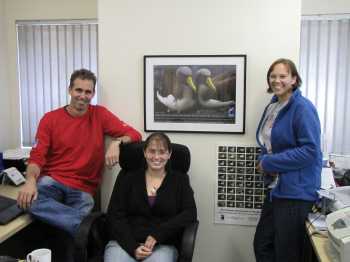In 1997 BirdLife International inaugurated its Global Seabird Programme (GSP). Over the years this has grown from a single employee to teams in several countries in the southern hemisphere. An important part of the GSP for the conservation of ACAP-listed species is its Albatross Task Force (ATF), which from its start in 2006 now has teams in seven countries in South America and Africa.
In southern Africa (South Africa and Namibia) BirdLife South Africa hosts local branches of both the GSP and the ATF through its Seabird Division, which is managed by Dr Ross Wanless and has offices in Cape Town close to the fishing harbour in Table Bay. Currently the Seabird Division has a staff of four, three of whom are fully occupied with activities related to the conservation of ACAP-listed albatrosses and petrels.

BirdLife South Africa's Ross Wanless, Christina Moseley and Lisa Mansfield with ACAP posters in their Cape Town office. Photograph by John Cooper
The BLSA Seabird Division's ACAP-related activities include:
Experimental sea trips to improve current or test new conservation measures;
Holding workshops with the fishing industry to share knowledge and concerns;
Training sea-going observers and compliance officers;
Organizing the manufacture of bird-scaring lines by a disadvantaged community with disabilities;
Working with three Atlantic and Indian Ocean Regional Fisheries Management Organizations (ICCAT, SEAFO); and IOTC; and
Co-ordinating work on marine Important Bird Areas (IBAs).
These activities have contributed to notable improvements in mitigation measures and the consequent reduction of bird bycatch in South Africa. Examples include:
Imposition of seabird bycatch limits for tuna longline vessels leading to increased compliance and a marked drop in seabird mortality by 70-85%; and
Adoption of bird-scaring lines in the demersal trawl fishery resulting in a 60% reduction in seabird mortality.
Each year BirdLife South Africa's Seabird Division hosts a week-long "Save our Seabirds Festival" in Cape Town with free public lectures by experts on seabird conservation, excursions to view seabirds at sea and to visit breeding islands and a photographic competition (click here).
With thanks to Ross Wanless for information.
John Cooper, ACAP Information Officer, 27 October 2010

 Français
Français  English
English  Español
Español